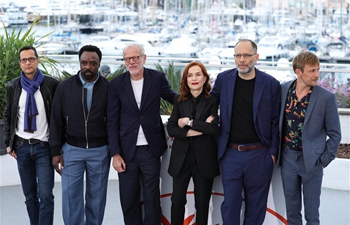BERLIN, May 21 (Xinhua) -- Germans use 2.8 billion disposable cups for hot drinks a year, according to a study conducted by the Federal Environment Agency (UBA) and published on Tuesday. The government is now taking steps to fight plastics pollution.
The cups along with the lids often end up in the environment after a short time because they are "carelessly thrown away or fall out of overflowing rubbish bins," said the UBA.
According to the study, 60 percent of disposable cups used in Germany in 2016 were plastic-coated paper cups, and the remaining 40 percent were pure plastic cups. Germans also used around 1.3 billion disposable plastic lids.
"Every disposable cup that is used is one too many. Disposable cups waste resources and pollute our environment. Returnable cups are the right way forward," said UBA President Maria Krautzberger.
In German cities, plastic-coated paper cups alone accounted for around 15 percent of the volume of existing trash cans, filling the equivalent of 8 million 50-liter city trash cans every year, according to UBA.
The agency suggests a "dual strategy" of voluntary as well as regulatory measures to reduce the use of disposable beverage cups "by 50 percent within two to three years" in Germany.
If no ambitious agreement was reached with German industry, however, the agency said "regulatory measures are considered necessary."
On Tuesday, the German Minister for the Environment, Svenja Schulze, presented plans to ban disposable polystyrene cups and introduced measures to strengthen returnable cup systems in Germany.
Schulze aims to implement the European Union (EU) ban on single-use plastics, which will come into force in 2021, ahead of schedule in Germany.
"I will continue my discussions with the retail trade on this issue," noted Schulze.
In addition, she is planning to make it easier for manufacturers to contribute to the disposal costs of their products if they littered parks, paths or beaches in Germany.
"Disposable cups are a growing environmental problem, especially in cities," Schulze stressed.
The use of resources is considerable as "disposable cups are only used for 15 minutes, but must always be made from fresh fiber paper," added Schulze.
Environmental Action Germany (DUH) called for a "nationwide deposit system for returnable cups," in which large coffee shop chains would participate.
The DUH proposed a levy of at least 20 euro cents on disposable cups and 10 euro cents on disposable lids in Germany, and called for a mandatory reduction target of 70 percent by 2022.
"We need ambitious legislation that is much more effective than voluntary agreements with business could ever be," said Barbara Metz, deputy federal managing director at Environmental Action Germany.
"So far, voluntary commitments have not solved any environmental problems in a sustainable way," Metz said.
On Tuesday, the EU formally adopted legislation to ban several disposable plastic products from 2021 onwards, including plastic plates and cutlery, as well as plastic straws and cotton swabs.













